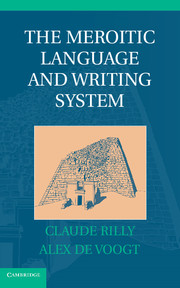III - Linguistic Affiliation
Published online by Cambridge University Press: 05 September 2012
Summary
Three principal methods have been used to progress toward the understanding of the Meroitic language.
First, there is the work on the philological details, which has been conducted at length by Griffith, and which allowed a decipherment of the script and the first advances toward our understanding of the language. It concerns the study of each inscription, its overall context (archaeological, iconographical, sociological), and its textual context (semantic, syntactic, paleographic). The hypotheses drawn from the study of a single text have to be confirmed with other texts. The results are often disappointing, but occasionally succeed in filling in unknown elements that shed some light on a passage of text. This approach is the most secure, but it is a slow, exasperating, time- and energy-consuming process with little gain. After the initial progress made by Griffith, it has proved particularly unrevealing in the decades that have followed. It requires a constant flow of new texts to feed the process.
The second method, the structural analysis, consists of a search of an entire corpus, rather than a case by case study, in which the possible arrangements and substitutions reveal rules of syntax. As confirmed by Hintze, the main proponent of this method, it does not achieve a better understanding of the text, but it prepares the way for applying the other two methods. Unfortunately, this method has many problems as well. It needs to compare passages that are relatively similar, and these are not found in great numbers except in the epitaphs. These texts, which seem the most stereotypical and the best studied in the Meroitic corpus, are as a consequence also the ones that can give us little extra understanding of the Meroitic language.
- Type
- Chapter
- Information
- The Meroitic Language and Writing System , pp. 62 - 105Publisher: Cambridge University PressPrint publication year: 2012



